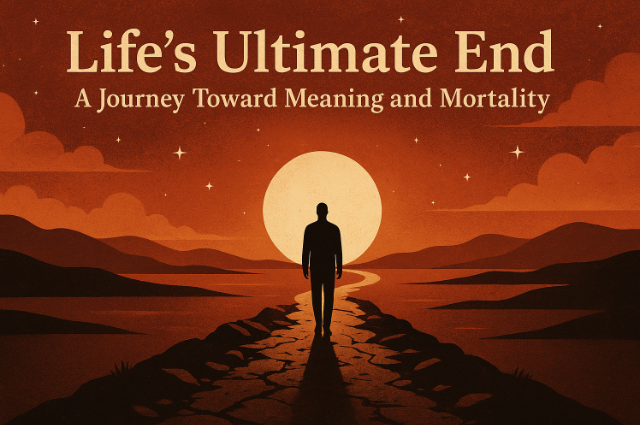
Life, as intricate, vibrant, and unpredictable, gives rise to one unavoidable fact—its demise. The final demise of life, death, is a topic of interest that has intrigued philosophers, mystics, scientists, and the common man for centuries. While it is seen with dread and terminus by some, by others, it is a passage, a culmination, or even a kind of emancipation. But aside from the biological end of our life, the concept of the ultimate end of life makes one ponder a more fundamental question: What is the meaning of existence if it all has to end?
Death is the one sure thing in life, but it's the most unsure of its timing and manner. No technology, money, or knowledge can save anyone from it. Even surrounded by it, through news, history, and individual loss, many exist in denial of its proximity. Such denial occurs through fear, but also from humanity's propensity to concentrate on the here and now or to believe, even unconsciously, in some sort of immortality of youth, relationship, and routine. Embracing the reality of death does not equate to living in terror. Far from it, many schools of philosophy and religious thought actually invite such acceptance as a means of reaching genuine wisdom. The Stoics, for example, practised "memento mori" —remember you will die—not to instil fear but to motivate individuals to live with purpose, aware that they have limited time.
Purpose as the True End
If life biologically ends in death, does that necessarily mean it is without purpose? Not at all. The fact that life is finite can be a mighty encouragement to live with meaning and significance. Although the ultimate culmination of life is death, the ultimate goal of life can be something much more fulfilling—growth, connection, contribution, or spiritual awakening. For others, the purpose of life is love—raising families, fostering friendships, or embracing the richness of human intimacy. For still others, it is service—working to make the world a better place, empowering the poor and the oppressed, or sharing knowledge and compassion. Some strive for truth in philosophy or science, while others find enlightenment in religion or contemplation. Each individual's response to "why we live" informs the way each faces the inevitability of death. One of the means by which individuals attempt to overcome death is through legacy. Even though we will not live forever, our actions, ideas, values, and love can survive us. Parents leave tradition to children, writers leave books behind, leaders leave movements, and teachers have an impact on generations yet to come.
Even the most mundane actions—such as assisting a stranger, forgiving another person, or acting with kindness—resound outward from us in hidden patterns. These reverberations of our lives create a form of symbolic immortality. Our flesh dies, but the significance that we build. Life's final conclusion might be mortality, but the fact that we have the power to shape the future lends our lives long-lasting value.
Most religious traditions teach us something about what exists after death, giving hope and answers to those who want more than the physical plane. Hinduism and Buddhism teach us of reincarnation and karma, positing life as a cycle, not a linear path. Christianity and Islam teach judgment, heaven, and eternal life. These pose death not as an end, but a change—a portal to a greater or more peaceful existence.
Philosophies, particularly existential ones, tend to deny meaning from without by religion and ask people to forge their own meaning in the face of an indifferent or absurd universe. Albert Camus and Jean-Paul Sartre, for example, maintained that life might not have an inherent purpose, but men and women are free and responsible to provide it with meaning.
A realisation of the end of life can be one of the most empowering things. It tells us not to squander time on pettiness, on grudges, on surface-level desires. It prompts us to love now, to dream now, to forgive, to explore, to think. A life that considers death to be a truer, more vibrant one. When we know we have a limited number of days, we might live each one more intensely. Life's true end is not death—it is knowledge, completeness, and tranquillity. It is the point when we can look back and be certain that we lived. Whether or not you believe in an afterlife or view death as irreversible, the reality is: we all only have a finite time to mould, experience, learn, and give.
To live well is to prepare for death, not in dread, but in readiness, having constructed significance from our days. Death will come to all of us. But the way we live, the love we share, the passions we pursue, and the legacy we create—these are what make life, even at its end, richly worth it.
